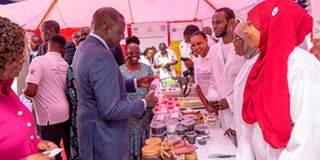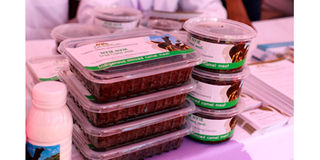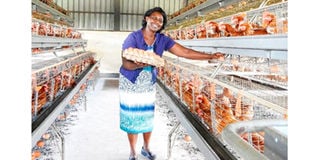USAID boosting northern Kenya’s meat economy through community co-investment and innovation
Sponsored by United States Agency for International Development

President William Ruto checks out products of Tawakal Women Co-operatives, a beneficiary of USAID support, on International Women’s Day on March 8, 2024.
The meat market in Kenya is projected to grow by 10 percent by 2028 due to rising demand for meat products, caused by an increasing population and more people who can afford the commodity.
The Government of Kenya’s (GOK’s) Bottom-Up Economic Transformation Agenda (BETA) prioritizes meat as one of the priorities for development in the livestock sector to create jobs for the growing population of youth in the country.
The United States Agency for International Development (USAID), through the US Government’s Feed the Future initiative, is supporting Kenya’s meat economy by strengthening co-operatives and small and medium-sized enterprises to transform the traditional pastoral economy into a more diversified cash-based economy. In partnership with the Co-operative University of Kenya and the GOK’s State Department for Co-operatives, USAID’s assistance complements Kenya’s efforts in creating jobs, enhancing market access, and increasing household incomes that help the communities diversify their livelihoods. Additionally, the USAID - GOK partnership helps reduce overgrazing in the fragile ecosystem, therefore assisting communities to adapt to climate change.
Empowering meat sector co-operatives through innovation
The development of co-operatives within the meat sector has encouraged members to venture into businesses such as butcheries. In Wajir County, the USAID-supported Wajir Butchers Co-operative, consisting of 110 members (36 female; 74 male), plays a key role in the meat value chain.

USAID has supported co-operatives with modern equipment to enhance production.
Every week, the co-operative aggregates meat from 245 camel pastoralists (each contributing one camel). The aggregation helps members reach end markets, and caters for diverse consumer preferences by offering various types and cuts of meat. Moreover, by pooling resources, co-operative members halve operational and transport costs, resulting in a 15 percent increase in incomes.
In Isiolo County, the Tawakal Women’s Co-operative focuses on value-adding camel products. With funding from USAID, they constructed a camel meat processing plant and acquired equipment like weighing scales, freezers, and meat sealers. This support enables the co-operative to process dried camel meat daily, locally known as Nyirnyir.
Before USAID support, Tawakal milk volumes were approximately 1,000 liters per day sold at Ksh120 per liter. However, with assistance from USAID, they now aggregate 3,000 liters of milk daily, sold at Ksh150 per liter, indicating a 275 percent growth in business. This expansion has also led to indirect job creation, with around 100 transporters and milk suppliers earning income through the Tawakal Co-operative.”
USAID also trained the co-operative members in proper food handling, thereby enhancing good practices during production. Additionally, the Activity provided Wajir Butchers and the Tawakal Women’s Co-operative access to sector experts to help improve their businesses and obtain product certification, boosting consumer confidence and supporting their marketing efforts. Through the co-operatives, members can also access credit facilities and boost their businesses.
Job Creation and Market Access in Northern Kenya
At the Tawakal Women’s Co-operative, 30 women are employed to prepare the meat, much of which is transported to Nairobi, where camel meat is consumed widely. Additionally, the co-operative has created job opportunities for over 100 camel milk transporters and meat distributors in the city, meeting the significant demand for camel products. This is helping the communities in northern Kenya to expand and diversify their economic opportunities, increasing job opportunities and opening of new market avenues. This in turn increases household incomes and boosts the local economy.
“Without USAID support Tawakal Co-operative would not exist. We are truly thankful for the exposure that we have gained from the various exchange visits. On various occasions, we interact with county officials who we also invite to audit our operations to ensure transparency,” says Ali Noor, a member of the co-operative.
Through the Kenya Livestock Market System (LMS), USAID has supported the co-operatives in their marketing efforts through exhibitions and large marketing events, which has significantly promoted the co-operative’s products and expanded networking opportunities. Additionally, USAID facilitates support for co-operatives and SMEs in northern Kenya by establishing direct connections with Nairobi-based meat distributors who purchase about 80 percent of northern Kenya’s livestock production for beef, goat, and camel meat.
The northern Kenya region is experiencing a significant shift in dietary habits within pastoral communities, facilitated by collaborative efforts between the county government and development partners to strengthen other value chains to enhance nutrition.

Value addition is creating job opportunities and increasing access to meat products.
“In the past, pastoral communities relied heavily on beef and milk as sources of protein. The introduction of additional food options such as fish, poultry, honey, vegetables, and fruits, has led to improved nutrition. We have moved from a malnutrition rate of 20 percent to a current rate now standing at 13 percent,” says Lucy Kaburu, Isiolo County’s Chief Officer for Trade and Co-operative Development.
Adapting to Climate Change through Diversification in the Meat Industry
In many parts of northern Kenya, excessive grazing of cattle and unpredictable weather patterns have increasingly degraded the quality and quantity of pasture available for livestock, leading to decreased productivity and, in some cases, the death of livestock during severe droughts.

INVEMS Poultry and Dairy Agencies increased their business options to adapt to climate change and increase food security in the region.
To adapt to climate change, businesses like INVEMS Poultry and Dairy Agencies and the Loiyangalani Fish Co-operative, and other producers supported by USAID through LMS and other projects such as NAWIRI, have significantly increased their business options in products such as poultry, eggs, and fish to increase food security in the region. This has brought a significant shift in dietary habits within the pastoral communities where more people in northern Kenya are incorporating white meat like chicken and fish into their diets.
“When I started the business, not many people were consuming poultry or eggs, as the traditional diets in northern Kenya do not include them as staple foods, and there was a limited supply of chicken in the locality. But now, I sell at least 16 crates of eggs per day,” says Agnes, the proprietor of INVEMS.
The Loiyangalani Fish Co-operative in Marsabit County is addressing the growing demand for fish by aggregating catch from its 205 members and marketing them collectively. Responding to market demand, the co-operative also processes and sells 1,000 kilograms of fish fillets monthly, and has established depots in Isiolo and Marsabit counties. The rising demand has prompted the co-operative to explore new markets in Meru, Busia, and Kisumu counties, as well as export opportunities to Uganda.
As part of climate change adaptation efforts, feedlots are also emerging, where farmers purchase animals from local livestock keepers, fatten them up, and then sell them, thereby commercializing livestock production and increasing pastoralists’ incomes.
About the Feed the Future USAID Kenya Livestock Market Systems Activity (LMS)
The Feed the Future Kenya Livestock Market Systems Activity is a United States Agency for International Development (USAID) funded program that is part of the United States Government’s Feed the Future initiative for addressing global hunger, food security, and agricultural livelihoods. It is implemented by ACDI/VOCA in six counties in northern Kenya – Garissa, Isiolo, Marsabit, Samburu, Turkana, and Wajir. Read more on https://www.usaid.gov/ under the Agriculture and Food Security tab.


